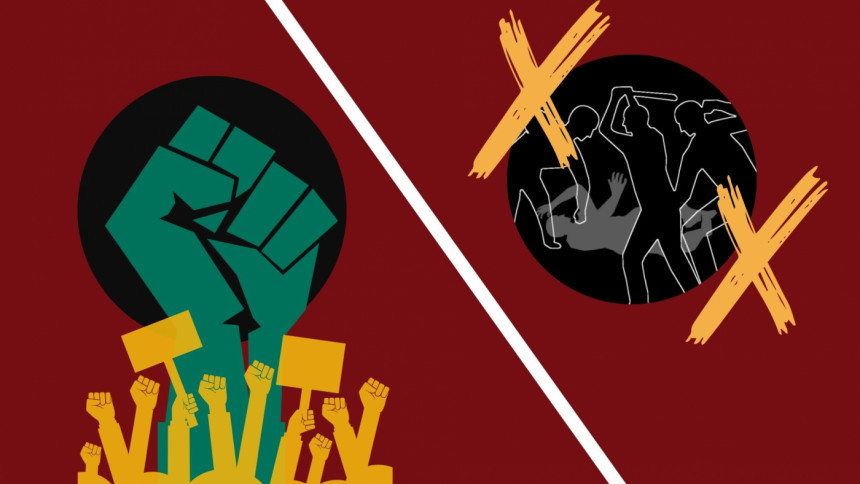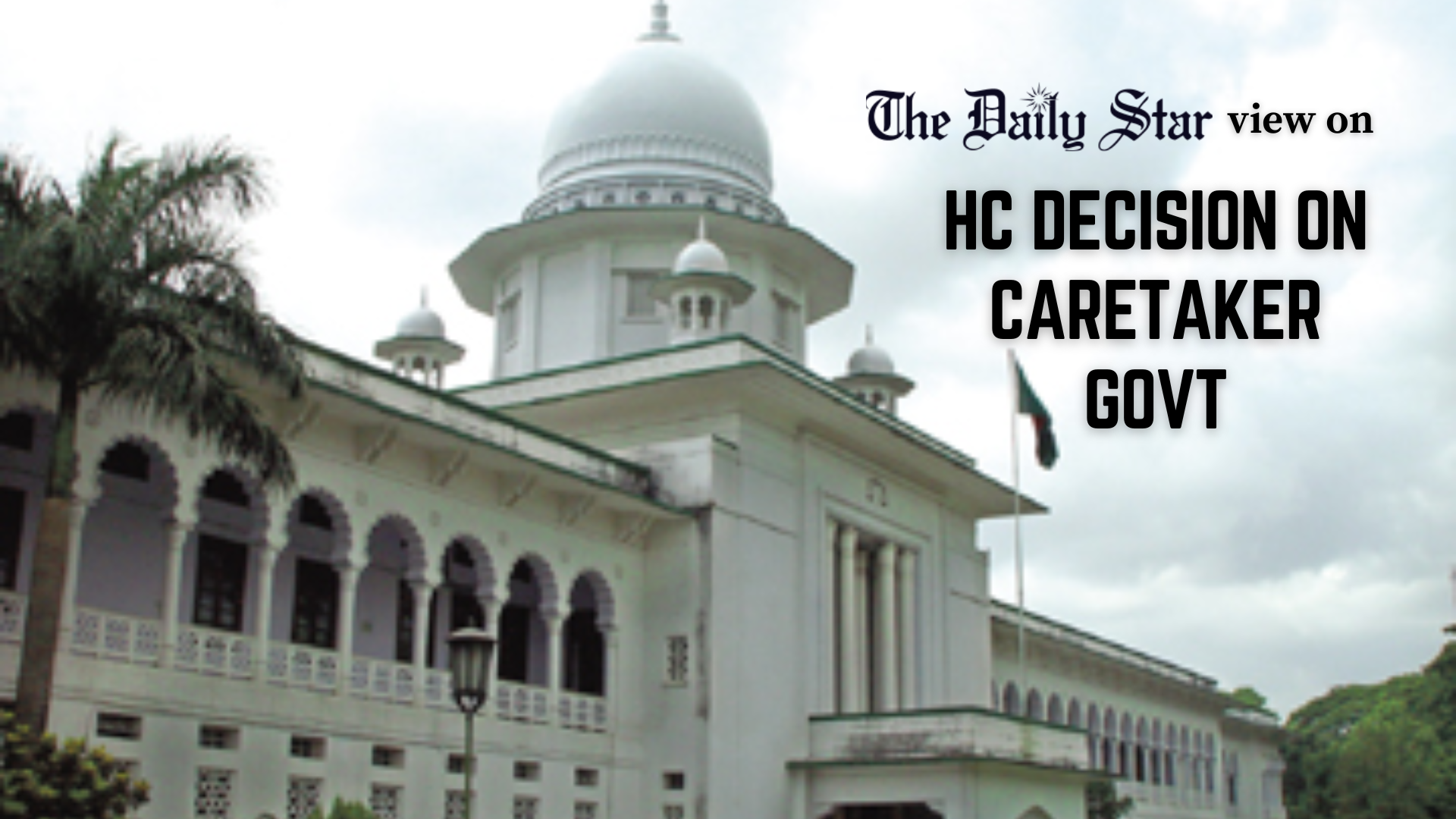The arrest of Khairul Haque: A travesty of justice or a convenient scapegoat?

The arrest of former Chief Justice ABM Khairul Haque from his Dhanmondi residence on July 24 has reignited a fierce debate surrounding his legacy, particularly his pivotal role in abolishing the non-partisan caretaker government system through the 13th Amendment judgment. While he currently faces murder charges linked to the tragic killing of teenager Abdul Kaiyum Ahad during the July uprising last year, the timing and nature of the cases raise critical questions. Is this truly about criminal accountability or is it political reckoning wrapped in legal formalism?
Justice Khairul Haque served as Bangladesh's 19th chief justice from September 2010 to May 2011, and later as the chairman of Bangladesh Law Commission until his resignation in August 2024, following the collapse of the Awami League regime. Now 81 years old and reportedly in poor health, he faces three separate cases—two in Dhaka's Jatrabari area and one in Narayanganj—including charges of sedition and issuing a fabricated verdict. These developments are unprecedented, and while no judge should be above the law, the manner and motivation behind these cases demand closer scrutiny.
At the centre of this legal storm lies the 13th Amendment judgment, delivered by the Appellate Division in 2011, which declared the caretaker government system unconstitutional. Introduced in 1996 through the 13th Amendment to address rampant political distrust and ensure free and fair elections, the caretaker government system was largely successful in its early years. The elections of 1996 and 2001, both conducted under caretaker governments, were widely viewed as credible and peaceful.
However, the 2006-07 crisis, during which the caretaker government overstayed its mandate and ruled under emergency powers, discredited the system. This became the pretext for challenging its constitutionality, eventually leading to the Appellate Division's verdict in 2011. The lead judgment, authored by Chief Justice Khairul Haque, held that the caretaker government system violated the basic structure of the constitution by allowing unelected individuals to exercise sovereign executive powers.
Yet, controversy surrounds not just the substance of the judgment, but also the process. The final decision was split 4:3, with Justice Khairul Haque joined by justices Md Muzammel Hossain, SK Sinha, and Syed Mahmud Hossain, all of whom later became chief justices. In contrast, the three dissenting judges—justices Muhammad Imman Ali, Md Abdul Wahhab Miah, and Nazmun Ara Sultana—did not ascend to the top post. Whether this is coincidence or consequence remains open to interpretation.
What particularly raises eyebrows is the discrepancy between the short order issued by the court on May 10, 2011—just days before Khairul Haque's retirement—and the full verdict published over a year later in September 2012. The short order had allowed for the 10th and 11th parliamentary elections to be held under the caretaker government system, invoking legal doctrines of necessity and state safety. It even recommended amendments to exclude former chief justices or Appellate Division judges from leading the caretaker government, but did not abolish the system outright.
However, when the full judgment emerged, it included entirely new directions. Most notably, it proposed that future elections be held under an interim government comprising elected members of parliament, with the sitting cabinet (albeit reduced in size) overseeing day-to-day governance. These modifications were not part of the original short order and were sharply criticised by Justice Md Abdul Wahhab Miah in his dissent, who called them "not in conformity with the short order." These additions ultimately paved the way for the Awami League to hold three consecutive elections (2014, 2018, and 2024) under its own authority—elections widely criticised for irregularities and lacking credibility.
This raises profound constitutional and political questions. Was the 15th Amendment, passed in June 2011 to abolish the caretaker government system, truly based on the 13th Amendment judgment, or was the judgment retrospectively edited to validate the 15th Amendment? The timeline is suspicious: the short order—still in force when the 15th Amendment was enacted—explicitly endorsed holding the next two elections under the caretaker government system. It never called for its outright repeal. That came only in the full judgment, published after the legal change had already been made.
If this was a judicial endorsement manufactured after the fact, it would represent not only a failure of process but a deliberate distortion of constitutional jurisprudence—a true travesty of justice. Khairul Haque's role, therefore, cannot be viewed in isolation. He was not a lone actor. Three other justices concurred with him. Yet, none of them face legal or political repercussions today. Why him, and why now?
The charges against Justice Haque, particularly the murder accusation, must be evaluated with utmost caution. Is it plausible that an 81-year-old former chief justice orchestrated a violent killing? Do the facts support such a conclusion, or is this a legally dressed act of vengeance? No matter how flawed or damaging his judgment may have been, the protections afforded to judges—such as those under the Judicial Officer's Protection Act of 1850—exist to guard against precisely this kind of political retribution. If he is to be held accountable, it must be under appropriate legal charges, not concocted ones. Any trial must be transparent, fair, and firmly rooted in the rule of law.
Justice, even when correcting injustice, must never become a tool of revenge. The arrest of a former chief justice is not an act to be taken lightly. It marks a significant moment in the country's legal and political history—a moment that should force us to reflect not only on Khairul Haque's controversial legacy but also on the integrity of our institutions, and the delicate balance between accountability and political vendetta.
Barrister Khan Khalid Adnan is advocate at the Supreme Court of Bangladesh, fellow at the Chartered Institute of Arbitrators, and head of the chamber at Khan Saifur Rahman and Associates in Dhaka.
Views expressed in this article are the author's own.
Follow The Daily Star Opinion on Facebook for the latest opinions, commentaries and analyses by experts and professionals. To contribute your article or letter to The Daily Star Opinion, see our guidelines for submission.




 For all latest news, follow The Daily Star's Google News channel.
For all latest news, follow The Daily Star's Google News channel. 

Comments